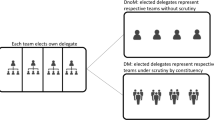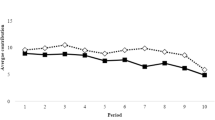Abstract
Common to most theoretical and empirical research on public goods is the assumption that the parameters of the game are common knowledge. Recent theoretical and empirical studies have questioned this assumption by arguing that many public goods situations are characterized by uncertainty regarding various aspects of the situation. In particular, Suleiman (1997) argued that members of production groups of step-level public goods are often uncertain about the value of the provision threshold. For this type of uncertainty he proposed three distinct models to account for the individual's contribution.
The present study reports the results of an experiment designed primarily to test and contrast the predictions derived from two of these models – a subjective expected utility model and a cooperative model – regarding the effects of threshold uncertainty on contribution for the provision of step-level public goods. Other goals of the study were to test the joint effect of the threshold uncertainty level, and its mean (low vs. high), on contribution, and to examine the effect of threshold uncertainty on the individuals' estimates regarding the contributions of other group members.
The results show that the effect of threshold uncertainty is moderated by the threshold mean: Contribution to the public good increased as a function of uncertainty for the lower threshold mean, and decreased (though not significantly) for the higher threshold mean. In contrast, for the two threshold means the subjects' estimates of the mean and variability of others' contribution increased with threshold uncertainty.The models' comparison revealed that the cooperative model was superior to the subjective expected utility model. This result adds to a substantial body of research on social dilemmas showing that under conditions of social (strategic) uncertainty, group members tacitly coordinate their choice behavior by anchoring their decisions on rules of fairness.
Similar content being viewed by others
References
Allison, S. T., L. R. McQueen, and L. M. Schaerfl. (1992). “Social decision making processes and the equal partitionment of shared resources, ” Journal of Experimental Social Psychology 28, 23–42.
Allison, S. T., and D. M. Messick. (1990). “Resource dilemmas with environmental uncertainty and asymmetric players, ” Journal of Behavioral Decision Making 3, 195–204.
Au, W. T. (1999). “Sequential step-level public good social dilemmas with an uncertain provision point, ” Manuscript submitted for publication.
Au, W. T., and D. V. Budescu. (1999). “Sequential effects in give-some and take-some social dilemmas, ” in M. Foddy, M. Smithson, S. Schneider, and M. Hogg (eds.), Resolving Social Dilemmas: Dynamic, Structural, And Intergroup Aspects. Psychology Press, pp. 87–99.
Au, W. T., X. P. Chen, and S. S. Komorita. (1998). “A probabilistic model of criticality in a sequential step-level public good dilemma, ” Organizational Behavior and Human Decision Processes 75, 274–293.
Budescu, D. V., A. Rapoport, and R. Suleiman. (1990). “Resource dilemmas with environmental uncertainty and asymmetric players, ” European Journal of Social Psychology 20, 475–487.
Budescu, D. V., A. Rapoport, and R. Suleiman. (1992). “Simultaneous vs. sequential requests in resource dilemmas with incomplete information, ” Acta Psychologica 80, 297–310.
Budescu, D. V., R. Suleiman, and A. Rapoport. (1995). “Positional order and group size effects in resource dilemmas with uncertain resources, ” Organizational Behavior and Human Decision Processes 65, 37–47.
Chen, X. P., W. T. Au, and S. S. Komorita. (1996). “Sequential choice in a step-level public good dilemma: The effects of criticality and uncertainty, ” Organizational Behavior and Human Decision Processes 61, 225–238.
Dawes, R. M. (1980). “Social dilemmas, ” Annual Review of Psychology 31, 169–193.
Dawes, R. M., J. M. Orbell, R. T. Simmons, and A. J. C. Van de Kragt. (1986). Organizing groups for collective action. American Political Science Review 80, 1171–1185.
Derman, C., L. J. Glesser, and I. Olkin. (1973). A Guide to Probability Theory and Applications. New-York: Holt, Reinhart and Winston.
Erev, I., and A. Rapoport. (1990). “Provision of step-level public goods: The sequential contribution mechanism, ” Journal of Conflict Resolution 34, 401–425.
Gustafsson, M. (1999). The Role of Asymmetric Information in Sequential Resource Dilemmas with Unknown Resource Size. Göteborg Psychological Reports, 29, No. 1. Department of Psychology, Göteborg University, Sweden.
Gustafsson, M., A. Biel, and T. Gärling. (1999a). “Overharvesting of resources of unknown size, ” Acta Psychologica 103, 47–64.
Gustafsson, M., A. Biel, and T. Gärling. (1999b). “Outcome-desirability bias in resource management problems. ” Thinking and Reasoning 4, 327–338.
Gustafsson, M., A. Biel, and T. Gärling. (in press). “Egoism bias in social dilemmas with resource uncertainty, ” Group Processes and Intergroup Relations vol? pages?
Hampton, J. (1987). “Free rider problems in the production of collective goods, ” Economics and Philosophy 3, 245–273.
Johnson, N. L., and S. Kotz. (1969). Distributions in Statistics: Discrete Distributions. Boston, MA: Houghton Mifflin.
Kerr. N. L. (1995). “Norms in social dilemmas, ” in D. Schroeder (ed.), Social Dilemmas: Social Psychological Perspectives. New York: Pergamon, pp. 31–47.
Laffont, J. J. (1975). “Macroeconomic constraints, economic efficiency and ethics: An introduction to Kantian economics, ” Economica 40, 430–437.
Margolis, H. (1982). Selfishness, Altruism and Rationality. Cambridge: Cambridge University Press.
Palfrey, T. R., and H. Rosenthal. (1988). “Private incentives and social dilemmas: The effects of incomplete information and altruism, ” Journal of Public Economics 28, 309–332.
Poppe, M., and L. Utens. (1986). “Effects of greed and fear of being gypped in a social dilemma situation with changing pool size, ” Journal of Economic Psychology 7, 61–73.
Raiffa, H., and R. Schlaifer. (1961). Applied Statistical Decision Theory. Cambridge, MA: MIT Press.
Rapoport, A. (1987). “Research paradigms and expected utility models for the provision of step-level public goods, ” Psychological Review 94, 74–83.
Rapoport, A., D. V. Budescu, R. Suleiman, and E. Weg. (1992). “Social dilemmas with uniformly distributed resources, ” in W. B. G. Liebrand, D. M. Messick, and H. A. M. Wilke (eds.), A Social Psychological Approach to Social Dilemmas. New York: Pergamon Press, pp. 41–55.
Rapoport, A., D. V. Budescu, and R. Suleiman. (1993). “Sequential requests from randomly distributed shared resources, ” Journal of Mathematical Psychology 37, 241–265.
Rapoport, A., and I. Erev. (1994). “Provision of step-level public goods: Effects of different information structures, ” in U. Schulz, W. Albers, and U. Muller (eds.), Social Dilemmas and Cooperation. Berlin: Springer-Verlag, pp. 147–171.
Rapoport, A., and E. Eshed-Levy. (1989). “Provision of step-level public goods: Effects of greed and fear of being gypped, ” Organizational Behavior and Human Decision Processes 44, 325–344.
Rapoport, A., and R. Suleiman. (1992). “Equilibrium solutions for resource dilemmas, ” Group Decision and Negotiation 1, 169–294.
Rapoport, A., and R. Suleiman. (1993). “Incremental contribution in step-level public goods games with asymmetric players, ” Organizational Behavior and Human Decision Processes 55, 171–194.
Rutte, C., H. Wilke, and D. M. Messick. (1987). “Scarcity and abundance caused by people or the environment as determinants of behavior in a resource dilemma, ” Journal of Experimental Social Psychology 23, 208–216.
Samuelson, C. D., and S. T. Allison. (1994). “Cognitive factors affecting the use of social decision heuristics in resource-sharing tasks, ” Organizational Behavior and Human Decision Processes 58, 1–27.
Suleiman, R. (1997). “Provision of step-level public goods under uncertainty: A theoretical analysis, ” Rationality and Society 9, 163–187.
Suleiman, R., and D. V. Budescu. (1999). “Common pool resource (CPR) dilemmas with incomplete information, ” in D. V. Budescu, I. Erev, and R. Zwick (eds.), Games and Human Behavior. Hillsdale, NJ: Lawrence Erlbaum, pp. 387–410.
Suleiman, R., D. V. Budescu, and A. Rapoport. (1994). “The position effect: The role of a player's serial position in a resource dilemma game, ” in U. Schulz, W. Albers, and U. Mueller (eds.), Social Dilemmas and Cooperation. Berlin: Springer Verlag, pp. 55–73.
Suleiman, R., and K. Or-Chen. (1999). “Providing step-level public goods under uncertainty: The case of probable external supply, ” in M. Foddy, M. Smithson, S. Schneider, and M. Hogg (eds.), Resolving Social Dilemmas: Dynamic, Structural, and Intergroup Aspects. Psychology Press, pp. 149–164.
Suleiman, R., and A. Rapoport. (1988). “Environmental and social uncertainty in single trial resource dilemmas, ” Acta Pcychologica 68, 99–112.
Suleiman, R., and A. Rapoport. (1992). “Provision of step-level public goods with continuous contribution, ” Journal of Behavioral Decision Making 5, 133–153.
Suleiman, R., A. Rapoport, and D. V. Budescu. (1996). “Fixed position and property rights in sequential resource dilemmas under uncertainty, ” Acta Psychologica 93, 229–245.
Suleiman, R., A. Rapoport, and D. V. Budescu. (1998). “Resource dilemmas under uncertainty: Testing Nash behavior, ” in E. D. Loehman, and D. M. Kilgour (eds.), Designing Institutions for Environmental and Resource Management. Cheltenham, UK: Edward Elgar, pp. 339–355.
Taylor, M. (1987). The Possibility of Cooperation. Cambridge: Cambridge University Press.
Taylor, M., and H. Ward. (1982). “Chickens, whales, and lumpy goods: Alternative models of public-goods provision, ” Political Studies 30, 350–370.
Van Dijk, E., and H. Wilke. (1993). “Differential interests, equity, and public goods provision, ” Journal of Experimental Social Psychology 29, 1–16.
Van Dijk, E., and H. Wilke. (1995). “Coordination rules in asymmetric social dilemmas: A comparison between public goods dilemmas and resource dilemmas, ” Journal of Experimental Social Psychology 31, 1–27.
Van Dijk, E., H. Wilke, M. Wilke, and L. Metman. (1999). “What information do we use in social dilemmas? Environmental uncertainty and the employment of coordination rules, ” Journal of Experimental Social Psychology 35, 109–135.
Van de Kragt, A. J. C., J. M. Orbell, and R. M. Dawes. (1983). “The minimal contributing set as a solution to public goods problems, ” American Political Science Review 77, 112–122.
Van Lange, P. A. M., and D. M. Messick. (1996). “Psychological processes underlying cooperation in social dilemmas, ” in W. Gasparski, M. Mlicki, and B. Banathy (eds.), Social Agency: Dilemmas and Educational Praxiology (Vol. 4). New Brunswick: Transactions, pp. 93–112.
Wit, A., and H. Wilke. (1998). “Public good provision under environmental and social uncertainty, ” European Journal of Social Psychology 28, 249–256.
Author information
Authors and Affiliations
Rights and permissions
About this article
Cite this article
Suleiman, R., Budescu, D.V. & Rapoport, A. Provision of Step-Level Public Goods with Uncertain Provision Threshold and Continuous Contribution. Group Decision and Negotiation 10, 253–274 (2001). https://doi.org/10.1023/A:1011205901283
Issue Date:
DOI: https://doi.org/10.1023/A:1011205901283




